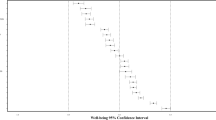Abstract
Objectives
The purpose of this study was to assess the relationship between economic security and self-rated health for elderly Japanese residents living alone.
Design
A secondary analysis of a cross-sectional study.
Setting
N City, H. Prefecture, Japan.
Participants
Survey questionnaires were distributed to 2,985 elderly residents living alone, aged ≥70 years, of which, 1,939 (65.0%) were returned and treated as valid responses.
Measurements
The survey included questions about gender, age, number of years spent in N City, self-rated health, economic security, number of years spent living alone, reason for living alone, life satisfaction, cooking frequency, frequency of seeing a doctor, long-term care service usage, as well as whether they enjoyed their lives, participated in social organizations.
Results
Of the respondents, 1,563 (80.6%) reported that they were economically secure, and 376 (19.4%) responded that they were insecure. The odds ratio predicting poor self-rated health for the economically insecure participants was significantly high (odds ratio: 3.19, 95%, Confidence Interval (CI): 2.53−4.02, and P < 0.001). Similarly, the adjusted odds ratio for poor self-rated health was significantly high for the economically insecure participants in multivariate analyses controlling for factors such as age, gender, cooking frequency, and social participation (adjusted odds ratio: 2.21, 95%, CI: 1.70−2.88, and P < 0.001). Furthermore, a similar trend was observed in stratified analyses based on gender and age groups.
Conclusion
Economic security predicted self-rated health independently of confounders, including social participation and cooking frequency, among the elderly Japanese living alone in communities.


Similar content being viewed by others
References
OECD (2015) In It Together: Why Less Inequality Benefits All. Paris: OECD Publishing.
Ministry of Health, Labour and Welfare (2013) Japan National Health and Nutrition Survey 2010. Tokyo: Daiichi Shuppan Publications. (Japanese)
DeSalvo KB, Bloser N, Reynolds K, et al. (2006) Mortality prediction with a single general self-rated health question. A meta-analysis. J Gen Intern Med 21, 267–275. doi: 10.1111/j.1525-1497.2005.00291.x
Idler EL, Russell LB, Davis D (2000) Survival, functional limitations, and self-rated health in the NHANES I Epidemiologic Follow-up Study, 1992. First National Health and Nutrition Examination Survey. Am J Epidemiol 152, 874–883.
Mavaddat N, Parker RA, Sanderson S, et al. (2014) Relationship of self-rated health with fatal and non-fatal outcomes in cardiovascular disease: a systematic review and meta-analysis. PLoS One 9(7), e103509. doi: 10.1371/journal.pone.0103509
Brenowitz WD, Hubbard RA, Crane PK, et al. (2014) Longitudinal Associations between Self-Rated Health and Performance-Based Physical Function in a Population-Based Cohort of Older Adults. PLoS One 9(11), e111761. doi: 10.1371/journal.pone.0111761
Kawachi I, Subramanian SV, Almeida-Filho N (2002) A glossary for health inequalities. J Epidemiol Community Health 56, 647–652.
Sulander T, Heinonen H, Pajunen T, et al. (2012) Longitudinal changes in functional capacity: effects of socio-economic position among ageing adults. Int J Equity Health 11, 78. doi: 10.1186/1475-9276-11-78
Nobles J, Weintraub MR, Adler N (2013) Subjective socioeconomic status and health: relationships reconsidered. Soc Sci Med 82, 58–66. doi: 10.1016/j. socscimed.2013.01.021
Litwin H, Sapir EV (2014) Perceived income adequacy among older adults in 12 countries: findings from the survey of health, ageing, and retirement in Europe. Gerontologist 49, 397–406. doi: 10.1093/geront/gnp036
Cabinet Office (2012) Annual Report on the Aging Society: 2012. http://www8.cao.go.jp/kourei/english/annualreport/2012/2012pdf_e.html. Accessed June 2017
Otaki N, Tanino N, Uemura H, et al (2014) Association between perceived health status and social participation among Japanese older adults who live alone. J Nutr Sci Res 3, 17–23. (Japanese)
Malhotra C, Chan A, Malhotra R, et al. (2011) Fifteen Dimensions of Health among Community-Dwelling Older Singaporeans. Curr Gerontol Geriatr Res 2011. 128581. doi: 10.1155/2011/128581
Lee MC, Huang N (2015) Changes in self-perceived economic satisfaction and mortality at old ages: evidence from a survey of middle-aged and elderly adults in Taiwan. Soc Sci Med 130, 1–8. doi: 10.1016/j.socscimed.2015.01.047
Ferrie JE, Martikainen P, Shipley MJ, et al. (2005) Self-reported economic difficulties and coronary events in men: evidence from the Whitehall II study. Int J Epidemiol 34, 640–648. doi: 10.1093/ije/dyi063
Rodriguez-Laso A, Abellan A, Sancho M, et al. (2014) Perceived economic situation, but not education level, is associated with disability prevalence in the Spanish elderly: observational study. BMC Geriatr 14, 60. doi: 10.1186/1471-2318-14-60
Szanton SL, Thorpe RJ, Whitfield K. (2010) Life-course financial strain and health in African-Americans. Soc Sci Med 71, 259–265. doi: 10.1016/j.socscimed.2010.04.001
Miyakawa M, Magnusson Hanson LL, Theorell T, et al. (2012) Subjective social status: its determinants and association with health in the Swedish working population (the SLOSH study). Eur J Public Health 22, 593–597. doi: 10.1093/eurpub/ckr064
Nummela OP, Sulander TT, Heinonen HS, et al. (2007) Self-rated health and indicators of SES among the ageing in three types of communities. Scand J Public Health 35, 39–47. doi: 10.1080/14034940600813206
Balabanova DC, McKee M (2002) Self-reported health in Bulgaria: levels and determinants. Scand J Public Health 30, 306–312. doi: 10.1080/14034940210164867
Ministry of Health, Labour and Welfare (2013) Comprehensive Survey of Living Conditions. http://www.mhlw.go.jp/toukei/saikin/hw/k-tyosa/k-tyosa13/. Aaccessed June 2017 (Japanese)
Arber S, Fenn K, Meadows R (2014) Subjective financial well-being, income and health inequalities in mid and later life in Britain. Soc Sci Med 100, 12–20. doi: 10.1016/j.socscimed.2013.10.016
Cheng YH, Chi I, Boey KW, et al. (2002) Self-rated economic condition and the health of elderly persons in Hong Kong. Soc Sci Med 55, 1415–1424.
Author information
Authors and Affiliations
Corresponding author
Rights and permissions
About this article
Cite this article
Otaki, N., Tanino, N., Yokoro, M. et al. Relationship between Economic Security and Self-Rated Health in Elderly Japanese Residents Living Alone. J Nutr Health Aging 22, 695–699 (2018). https://doi.org/10.1007/s12603-017-0994-0
Received:
Accepted:
Published:
Issue Date:
DOI: https://doi.org/10.1007/s12603-017-0994-0




